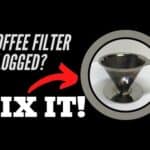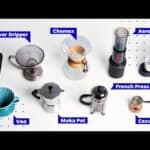Learn how to make homemade pour over coffee, how to tweak your drip coffee, and why manual drip brewing is so great. Also, we recommend a few drip cones.
Homemade Pour Over Coffee
Probably one of the hottest manual coffee brewing methods is pour over. There are many places where convenience overrules taste where it has grown in popularity. This tutorial on “how to make pour-over coffee” was my project for a while, and as a manual brewing enthusiast, I should have done it sooner.
Anyhow, today I will show you how to brew a perfect hand drip coffee after I shook off the lethargy. My main reason for this is a recent coffee date I went on. My friend ordered a latte while I ordered a pour-over-filter-coffee. She notices that the coffee is taking longer than normal after a few minutes of chatting. Pour over brewing takes a little longer to prepare than espresso coffee.
She pointed to the barista who was bent over the pour over coffee equipment and said: “But it looks so easy!Indeed, a manual coffee dripper makes brewing coffee easy. If you make a little mistake, your coffee will be ruined. It is important to be precise and to respect the recipe and the technique. I spent the rest of the date talking about pour over coffee brewing and wondering if other people thought it was simple.
Automatic vs Manual Drip
Drip coffee has long been popular in the United States. Manual methods of brewing filter coffee have become increasingly popular in recent years. Manual coffee makers are advantageous because the barista can control and alter all of the variables involved in the preparation of coffee. In contrast, with an automatic drip coffee maker, the machine makes many of these decisions for you. There is no room for adjustment, therefore particular coffee beans will be favored during extraction, leaving a tiny margin for error. The typical temperature and duration for extraction of automatic drip machines will not work for unique beans and roasts.
Checklist for Manual Drip Coffee
- Freshly roasted coffee beans
- Drip Cone brewing device
- Coffee filters – cone-shaped
- Timer to avoid under or over extraction
- Scale or a scoop to measure your quantity
- Grinder – a good grinder is mandatory
- Kettle – a pour over kettle helps a lot
Pour-over coffee brewers are cone-shaped devices with a hole in the bottom, usually placed on a stand with a cup or carafe beneath, although many manual drip brewers stand alone.
After that, you need the right filter to fit your device, which sits inside the cone. The filters can be paper filters or metallic screen filters. It is entirely up to you, and the filter will affect the taste and aroma of the final cup.
It is important to use consistent measurements every time if you want consistency. Many baristas use a scale to measure everything, including water. You’ll see why later on. You need a timer for timing your brew. If you brew too short, the coffee will be under-extracted. Brew it too long and you could have a bitter over-extracted coffee or a cold beverage.
The grinder is essential as with any other brewing method. You need to freshly grind your beans, and the grind needs to be very uniform. A decent grinder will help you achieve that grind consistency for a perfect extraction and a clean cup. Having the option to easily adjust your grind size might be essential for your cup. A nice article by Maddie at Kicking Horse shows you how the grind size affects extraction.
A pour over or gooseneck kettle with a narrow pouring nozzle is something I strongly suggest. When preparing coffee, this gives you a lot more control over the pouring. With a typical kettle spout, making a flawless pour-over brew is nearly impossible. All that’s left is for you to choose your favorite freshly roasted coffee.
The coffee and filter are left out in the open with manual drip brewing, and the water is added by the barista rather than a machine. Glass, plastic, ceramic, and metal are all options for pour over coffee makers. Pour over coffee makers made of glass or plastic are popular because they allow you to watch the entire process unfold.
Best Coffee Beans for Pour Over
The best pour over coffees are those that are lighter, brighter, and fruitier. Darker, fuller-bodied coffees are generally not recommended for use with pour-over machines. Because the brewing time for pour over coffees is shorter than for French press coffees, much of the bean’s deeper tastes and oils are not removed.
A light to medium roast coffee with light, bright, and flowery overtones is my recommendation. Ethiopian and Rwandan coffees are always a wonderful choice. Brazilian beans, on the other hand, are an excellent choice for those with a sensitive palate. If you are looking for best pour over coffee maker recommendation, we have a list for you.
Was this helpful?
Hi there! I’m a food enthusiast and journalist, and I have a real passion for food that goes beyond the kitchen. I love my dream job and I’m lucky enough to be able to share my knowledge with readers of several large media outlets. My specialty is writing engaging food-related content, and I take pride in being able to connect with my audience. I’m known for my creativity in the kitchen, and I’m confident that I can be the perfect guide for anyone looking to take their culinary journey to the next level.








![Preparing [champ chicken sausage] - raw sausages boiling in a pot and cooking in a pan.](https://milkwoodrestaurant.com/wp-content/uploads/2026/02/image-1-4-150x150.jpg)
